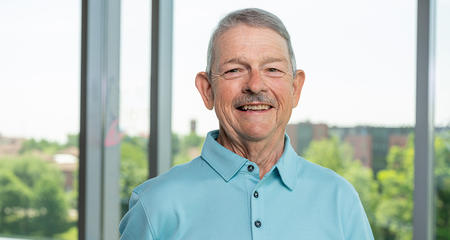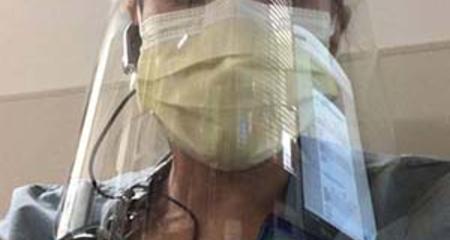You may spend an extended period in the early stages of heart failure before progressing to the advanced stages. The early phase allows for proactive management, including risk reduction and treatment strategies to slow or halt progression. Heart failure's course, however, can vary widely among individuals.
In certain cases, particularly when confronted with severe heart attacks or acute inflammation of the heart muscle, it can lead to the abrupt onset of end-stage damage, sometimes resulting in cardiogenic shock. We are well-prepared to address such critical situations through our specialized Cardiogenic Shock and Temporary Mechanical Support Program. This program serves as a lifeline, providing a bridge to recovery for some patients. For others, if recovery is not attainable, it serves as a bridge to advanced heart replacement treatments such as heart transplantation, durable left ventricular assist devices (LVADs) or total artificial hearts. Our comprehensive approach ensures that even in the most challenging circumstances, we can offer the best possible care and treatment options for our patients.
In advanced heart failure (late Stage C or Stage D), heart failure symptoms persist despite optimal medical and device therapy. Severe symptoms significantly impact your quality of life and offer a poor prognosis.
Some common signs and symptoms associated with advanced heart failure include:
- Extreme breathlessness even at rest or with minimal exertion, making daily activities challenging.
- Profound and persistent fatigue, weakness, and limited stamina are common in advanced heart failure.
- Severe fluid buildup can lead to significant swelling in the legs, ankles, and sometimes even the abdomen, causing discomfort and difficulty moving.
- Sudden and significant weight gain can occur due to fluid retention, indicating worsening heart failure.
- Patients with advanced heart failure often require frequent hospitalizations due to worsening symptoms and complications.
- Loss of appetite and nausea can be common, contributing to unintentional weight loss.
- A persistent, often productive cough can develop as fluid accumulates in the lungs.
- Reduced cognitive function and confusion can occur due to decreased blood flow to the brain.
- Chest discomfort or pain may be present, indicating the strain on the heart. Arrhythmias, including rapid or irregular heartbeats, may be more frequent and lead to palpitations, dizziness, or fainting.
Heart failure can have far-reaching effects on various organs and systems in the body. Some of the common organ damage and complications associated with heart failure include:
- Kidney damage can result in fluid retention, reduced blood flow to the kidneys and worsening heart failure symptoms.
- Liver congestion, where fluids build up in the liver, is characterized by elevated liver enzymes and abdominal discomfort.
- Lung congestion, or fluid accumulation in the lungs, results pulmonary edema and causes severe shortness of breath and requires immediate medical attention.
- Gastrointestinal issues and digestive problems include nausea, loss of appetite and abdominal discomfort.
- Muscle wasting (cachexia) caused by advanced heart failure may result in weakness and fatigue.
- Anemia (low iron levels in the blood), brought on by advanced heart failure, can further contribute to fatigue and weakness.
- Endocrine abnormalities caused by a disruption in the balance of various hormones can potentially affecting metabolism and other bodily functions.
Advanced Heart Failure Treatment Experts
Our program specializes in advanced heart failure treatments such as heart transplantation and mechanical circulatory support. We also offer palliative care and end-of-life planning for comprehensive support.
When heart failure progresses to late-stage C and Stage D, a highly specialized approach becomes paramount. This is the core focus of our Advanced Heart Failure Program multidisciplinary team collaborates to deliver personalized care, optimizing outcomes and enhancing the quality of life for our patients. Our program includes heart transplantation, a treatment option with proven superior results, for eligible candidates, ensuring the best possible chance for an improved and extended life. Additionally, we offer a dedicated left ventricular assist device (LVAD) program, providing advanced mechanical support for those who may benefit from this life-saving technology.
Advanced Heart Failure and Transplant Outreach Clinic
In addition to seeing patients with heart failure at Froedtert Hospital in Milwaukee, we also see patients at our outreach clinic located in Fond du Lac, Wis.
This additional location allow patients who have advanced heart failure to see a Froedtert & MCW heart failure cardiologist near their home and, if indicated, may facilitate referral to Froedtert Hospital for advanced cardiac therapies, including heart transplant.
To make an appointment with a Froedtert & MCW physician at our outreach clinic, please call 414-777-7700.
Advanced Heart Failure and Transplant Outreach Clinic — Fond du Lac
420 E. Division St.
Fond du Lac, WI 54935
Referrals and Second Opinion Program
We are happy to work your doctor or with you to explore more options regarding your heart condition.
Virtual Visits Are Available
Safe and convenient virtual visits by video let you get the care you need via a mobile device, tablet or computer wherever you are. We'll assess your condition and develop a treatment plan right away. To schedule a virtual visit, call 414-777-7700.
Recognized as High Performing by U.S. News & World Report
Froedtert Hospital, Froedtert Menomonee Falls Hospital and Froedtert West Bend Hospital are recognized by U.S. News & World Report as high performing in heart failure care.More to Explore





